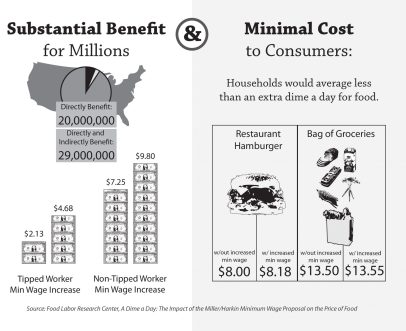Labor & Economy
Achieving Obama’s Economic Goals: Five Steps to Take

President Obama’s inspiring inaugural address thrust a challenge upon every American: We must work to build a nation which “thrives when every person can find independence and pride in their work;” an America where “the wages of honest labor liberate families from the brink of hardship.”
Confronted by a Republican House and cautious centrist Democrats, the President can only seek progressive economic reform if the 99 Percent organize to demand it.
Fortunately, there’s no shortage of ideas around which we can organize. Here are five practical proposals for redirecting the U.S. economy toward justice, crafted by some of our wisest economic experts.
1) Increase the federal minimum wage to $9.80 per hour, as proposed by Senator Tom Harkin and Rep. George Miller. This one simple step will improve the lives of 29 million workers. Contrary to claims by the fast food chains and other low wage employers, raising the minimum has little effect on consumer prices and no negative effect on job creation.
 2) Restore full employment with a massive public investment program, even if it temporarily increases the deficit. Deterioration of our nation’s infrastructure poses one of the greatest threats to our nation’s future prosperity. With interest rates low and unemployment high, now is the best time in decades to rebuild the roads, water systems and clean energy infrastructure economic growth requires, argues Andrew Fieldhouse of the Economic Policy Institute. A trillion dollar investment (that’s $1,000,000,000,000!) in public works over the next five to seven years would speed the return to full employment. By making our economy more productive, borrowing to fund this pro-worker and pro-business program would also do far more than public service reductions to cut the U.S. deficit in the medium to long term.
2) Restore full employment with a massive public investment program, even if it temporarily increases the deficit. Deterioration of our nation’s infrastructure poses one of the greatest threats to our nation’s future prosperity. With interest rates low and unemployment high, now is the best time in decades to rebuild the roads, water systems and clean energy infrastructure economic growth requires, argues Andrew Fieldhouse of the Economic Policy Institute. A trillion dollar investment (that’s $1,000,000,000,000!) in public works over the next five to seven years would speed the return to full employment. By making our economy more productive, borrowing to fund this pro-worker and pro-business program would also do far more than public service reductions to cut the U.S. deficit in the medium to long term.
3) Reduce the non-war military budget to the Bush-era level. Believe it or not, routine defense spending (the amount the U.S. military spends on everything but our foreign wars) has actually crept upward in the past six years. Cutting back to the 2007 level would save $500 billion over the next decade. All government spending creates jobs, but spending on human needs creates more jobs than spending on war. Transferring the savings to domestic programs could create up to 800,000 jobs without weakening national defense, says Lawrence J. Korb, who was an Assistant Secretary of Defense under President Reagan. Click here for Korb’s detailed list of the most wasteful parts of military budget.
4) Invest in high-quality, universal early childhood education. This investment — which would preserve and greatly expand on the proven success of Headstart and other existing education programs — will more than pay for itself, writes University of Massachusetts Economics Arthur MacEwan. “Economic gains are reflected in the higher salaries that the children earn later in life, the greater economic contribution to society that these salaries tend to reflect, and the higher resulting tax payments. There are also impacts that yield fiscal savings for the government: lower incidences of grade retention and special education; elevated high school graduation rates and college-attendance rates; reduced reliance on social support programs; and less engagement with the criminal justice system.”
5) Adopt the common sense tax proposals in Vermont Senator Bernie Sanders’ deficit reduction plan including:
Ending all tax breaks for oil, gas and coal companies.
- Imposing an emergency surtax on millionaires.
- Making Wall Street pay an extra tax on the swaps, derivatives and other speculative investments that crashed our economy.
- Canceling tax breaks for companies that move jobs overseas.
- Eliminating abusive off-shore tax shelters.
- Assessing investors at the same tax rates as wage earners.
(Steve Askin is Research Director for Good Jobs LA, where his post first appeared. The opinions expressed above are his own. Republished with permission.)
-

 Latest NewsApril 3, 2024
Latest NewsApril 3, 2024Tried as an Adult at 16: California’s Laws Have Changed but Angelo Vasquez’s Sentence Has Not
-

 Latest NewsApril 17, 2024
Latest NewsApril 17, 2024Despite Promises of Transparency, California Justice Department Keeps Probe into L.A. County Sheriff’s Department Under Wraps
-

 Latest NewsMarch 20, 2024
Latest NewsMarch 20, 2024‘Every Day the Ocean Is Eating Away at the Land’
-

 State of InequalityApril 4, 2024
State of InequalityApril 4, 2024No, the New Minimum Wage Won’t Wreck the Fast Food Industry or the Economy
-

 State of InequalityApril 18, 2024
State of InequalityApril 18, 2024Critical Audit of California’s Efforts to Reduce Homelessness Has Silver Linings
-

 State of InequalityMarch 21, 2024
State of InequalityMarch 21, 2024Nurses Union Says State Watchdog Does Not Adequately Investigate Staffing Crisis
-

 Latest NewsApril 5, 2024
Latest NewsApril 5, 2024Economist Michael Reich on Why California Fast-Food Wages Can Rise Without Job Losses and Higher Prices
-

 Latest NewsMarch 22, 2024
Latest NewsMarch 22, 2024In Georgia, a Basic Income Program’s Success With Black Women Adds to Growing National Interest




















